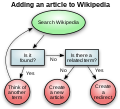In information technology a reasoning system is a software system that generates conclusions from available knowledge using logical techniques such as...
17 KB (1,945 words) - 01:39, 18 February 2024
artificial intelligence, a procedural reasoning system (PRS) is a framework for constructing real-time reasoning systems that can perform complex tasks in...
10 KB (1,168 words) - 04:43, 31 July 2024
representation and reasoning and metalogic, the area of automated reasoning is dedicated to understanding different aspects of reasoning. The study of automated...
14 KB (1,398 words) - 16:28, 17 May 2025
Probabilistic logic (redirect from Non-Axiomatic Reasoning System)
Probabilistic logic (also probability logic and probabilistic reasoning) involves the use of probability and logic to deal with uncertain situations....
17 KB (2,003 words) - 22:20, 19 May 2025
to represent knowledge explicitly, called a knowledge base, and a reasoning system that allows them to derive new knowledge, known as an inference engine...
11 KB (1,231 words) - 22:03, 18 August 2024
In artificial intelligence, model-based reasoning refers to an inference method used in expert systems based on a model of the physical world. With this...
6 KB (781 words) - 17:05, 6 February 2025
Logical reasoning is a mental activity that aims to arrive at a conclusion in a rigorous way. It happens in the form of inferences or arguments by starting...
70 KB (7,326 words) - 19:11, 12 May 2025
In artificial intelligence (AI), commonsense reasoning is a human-like ability to make presumptions about the type and essence of ordinary situations...
27 KB (3,061 words) - 08:27, 24 April 2025
human expert. Expert systems are designed to solve complex problems by reasoning through bodies of knowledge, represented mainly as if–then rules rather...
54 KB (6,367 words) - 17:51, 20 March 2025
Deductive reasoning is the process of drawing valid inferences. An inference is valid if its conclusion follows logically from its premises, meaning that...
70 KB (8,482 words) - 21:20, 15 February 2025
Diagrammatic reasoning is reasoning by means of visual representations. The study of diagrammatic reasoning is about the understanding of concepts and...
15 KB (1,824 words) - 12:57, 23 October 2024
opportunistic reasoning, pieces of knowledge may be applied either forward or backward, at the "most opportune time". An opportunistic reasoning system may combine...
2 KB (203 words) - 12:27, 12 February 2022
formally represent it as knowledge in knowledge-based systems. Whereas knowledge representation and reasoning (KRR, KR&R, or KR²) also aims to understand, reason...
42 KB (5,286 words) - 17:45, 8 May 2025
Case-based reasoning (CBR), broadly construed, is the process of solving new problems based on the solutions of similar past problems. In everyday life...
17 KB (2,137 words) - 19:38, 13 January 2025
In artificial intelligence, the distributed multi-agent reasoning system (dMARS) was a platform for intelligent software agents developed at the AAII that...
2 KB (210 words) - 03:27, 31 July 2024
semantic web, and the strengths and limitations of formal knowledge and reasoning systems. Symbolic AI was the dominant paradigm of AI research from the mid-1950s...
88 KB (11,007 words) - 14:49, 24 April 2025
Semantic reasoner (redirect from Reasoning engine)
also examples of probabilistic reasoners, including non-axiomatic reasoning systems, and probabilistic logic networks. Notable semantic reasoners and...
6 KB (573 words) - 20:34, 9 August 2024
the Procedural Reasoning System (PRS) and Distributed Multi-Agent Reasoning System (dMARS). JACK is one of the few multi-agent systems that uses the BDI...
14 KB (1,466 words) - 00:42, 22 April 2025
Backward chaining (redirect from Backward reasoning)
commonly used methods of reasoning with inference rules and logical implications – the other is forward chaining. Backward chaining systems usually employ a depth-first...
6 KB (806 words) - 11:50, 13 December 2024
Forward chaining (category Expert systems)
Forward chaining (or forward reasoning) is one of the two main methods of reasoning when using an inference engine and can be described logically as repeated...
6 KB (703 words) - 09:35, 8 May 2024
In philosophy of logic, defeasible reasoning is a kind of provisional reasoning that is rationally compelling, though not deductively valid. It usually...
19 KB (2,378 words) - 02:16, 28 April 2025
diagnosis. Another example of a CDSS would be a case-based reasoning (CBR) system. A CBR system might use previous case data to help determine the appropriate...
45 KB (5,676 words) - 20:06, 23 April 2025
intelligent applications. At its heart is a knowledge representation and reasoning system that combines a Frame-based language with an automatic classifier engine...
4 KB (472 words) - 08:15, 18 February 2025
Outline of thought (section Reasoning)
Syllogism – Type of logical argument that applies deductive reasoning Theory – Supposition or system of ideas intended to explain something Thought experiment –...
34 KB (5,081 words) - 08:06, 6 January 2025
in the subject of abduction. Diagnostic expert systems frequently employ abduction. Deductive reasoning allows deriving b {\displaystyle b} from a {\displaystyle...
76 KB (9,972 words) - 18:08, 11 April 2025
Inductive reasoning refers to a variety of methods of reasoning in which the conclusion of an argument is supported not with deductive certainty, but...
67 KB (8,642 words) - 20:39, 9 April 2025
were produced by the AAII were a procedural reasoning system (PRS); distributed multi-agent reasoning system (dMARS); and a Smart Whole AiR Mission Model...
7 KB (730 words) - 08:46, 15 November 2024
determine reasoning rather than an underlying mechanical structure. The other reasoning process in Sloman's opinion was of the Rule-based system. The system functioned...
57 KB (7,233 words) - 23:54, 14 April 2025
Analytical reasoning, also known as analytical thinking, refers to the ability to look at information, be it qualitative or quantitative in nature, and...
5 KB (525 words) - 10:26, 25 December 2024





